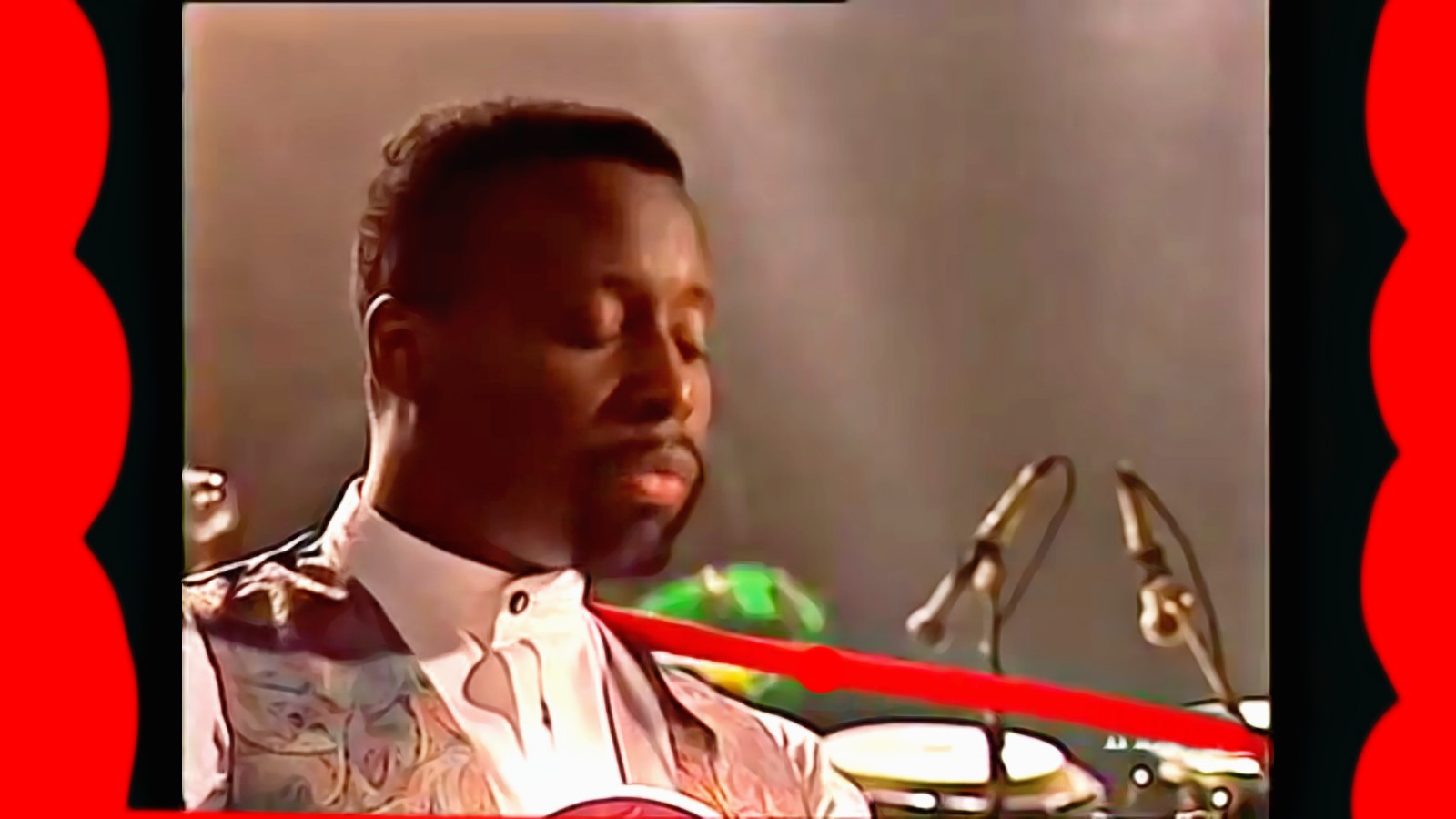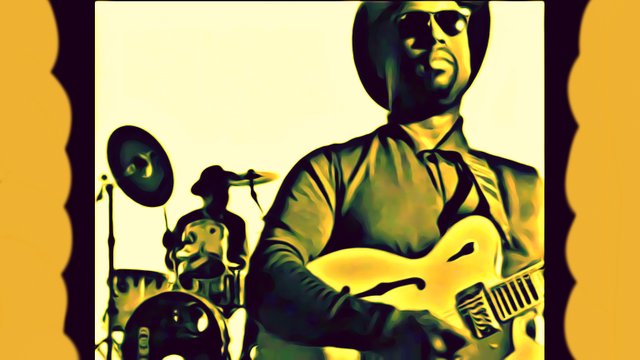Guitarist Ronny Jordan -- Part 4 of my Interview

Ronny recounts the freaky coincidence of Miles Davis embracing hip hop just after he released "The Antidote." In part three we left off with Ronny getting a record deal and recording his first single.
link to part 1
Ronny Jordan Interview
Ronny Jordan: The very first gig I did as Ronny Jordan was in December of 1991 and this was in Brixton at the Fridge, and they wouldn't let me through the door. I told them I was Ronny Jordan and they said, “Ronny Jordan is American.” And I'm like, “I'm Ronny Jordan!” And then another guy came and said, “It's him, it's him.” So they let me in, and it was sold out, and it was an amazing show. They were freakin' out, and they started playing So What around the clubs. Everyone was just goin' crazy. It was the first single release on Island Records in January of 1992 and it went into the charts.
I was at Ronnie Scott's club that Sunday – Roy Ayers, the vibes player, was doing two weeks at Ronnie Scott's, and the week would run from Monday to Saturday. So Sunday was his day off, and he'd be back on Monday. So another artist will come in and perform that day, and I was there and doing the sound check. And every Sunday the new charts come out for the week, and I'd forgotten about it. So after sound check I was standing outside of Ronnie Scott's and this girl comes down the street screaming, “Twenty-nine, twenty-nine!” So they're going crazy and I'm lookin' around and asking, “What's wrong?” And they said, So What just went into the charts at twenty-nine!” I was mobbed, so we did the gig that night, and the champagne was flowing and I got to meet Ronnie Scott that night. It was an amazing surreal experience and I think it was the first jazz record in the charts for 30 years – I think it was Take Five that was in the charts in 1962, and that was the year I was born. So now we're in 1992, and now So What is in the charts.
Miles Davis embraces hip hop
Alan Bryson: Miles Davis must have been smiling down on that, what a great thing, it's a perfect story.
Ronny Jordan: It was amazing. I was doing an interview and was asked if I'd ever heard Miles' last studio album, and I say no I hadn't heard it. And they played The Doo Bop Song and I almost fell of my chair, because Miles and I were in the same direction, because Miles was doing hip hop jazz too. Doo Bop was released right after The Antidote and he produced it with a New York producer named Easy Mo Bee. I never met Easy Mo Bee, but we talked on the phone and there was a possibility of him producing my second album but it didn't materialize. I wish I could have worked with him because we could have done amazing things together – but we'll never know now. But he produced Miles' Doo Bop album and it was amazing when people started comparing it to The Antidote, and people were saying if he had lived he would have approved.
People would ask me if Miles would have approved of me doing his So What and I said, “I think he would, because Miles was always for changing.” So when Doo Bop came out in the summer of 1992, then people knew I was right, and most agreed that Miles would have approved of my doing So What.
Alan Bryson: Ronny I'm not a jazz historian, but when you think back, in the '20s, '30s, and '40s jazz was dance music. Are you maybe the first guy since then who brought jazz back into clubs to dance to?
Ronny Jordan: It was deliberate, because I studied my history, and in order for jazz to be relevant and survive, you have to have young people involved, and you have to use modern elements. So, my thing was, if I use hip hop elements, that would attract young people. The elders, they like the beats, but they're more there for the chops. I've always described my music as music for the head and the feet.
Alan Bryson: And I would put the heart in there too.
Ronny Jordan: Absolutely, that too. I keep telling people, jazz was the pop music of its day. You had a good time. In the '60s jazz got a little cool, and then you had this free jazz movement from the late '50s, '60s, '70s and that's all well and good, but because of rock & roll and soul young people moved away from jazz. Then in the '70s it sort of came back, you had funk like Roy Ayers and George Benson.
Alan Bryson: Didn't you get Roy Ayers in to record with you on Brighter Day?
Ronny Jordan: We're good friends, and he's another musical influence. He may not play guitar, but he's a musical influence – I listened to a lot of his records growing up.
But in any case, it was important to keep that youth element.
Wes Montgomery & Critics
Alan Bryson: I think Wes Montgomery tried that and got a lot of grief from jazz purists about that. But he said something like, “Look, I'm playing popular music with a jazz foundation, so get over it!”
Ronny Jordan: There's nothing wrong with that. There's an old saying in the South, if you ain't paying me, I'm not listening. I don't mind constructive criticism, it's healthy, but when people just criticize for the sake of criticizing, that's messed up. I don't like it. I think a lot of critics are failed musicians who never got past first base, and they're jealous of the success. They would have preferred that Wes was broke and struggling. For them, that's the beauty of jazz, when you broke and struggling, and you're trying to make ends meet. When you're successful and having hit records, that goes against the grain and the fact is, Wes crossed over, like I crossed over.
The critics seem to have a problem with it, but my thing is, they're not paying me, so I'm not listening to them. They don't have any bearing or relevance on what I do.
Alan Bryson: You know Ronny my thing is, if I talk to people, it's to people whose music touches me, and that means I can be positive, enthusiastic, and honest. But if I were just churning out interviews and talking to people whose music I don't get or don't like, that's not a healthy combination. I think if an artist is out there givin' everything he's got, if someone doesn't happen to like it, that's just one person, and lots of other people may like it – so just leave it alone.
Ronny Jordan: That's it, just leave it alone. I never like to criticize because you know, I don't take my opinion seriously. Everyone has an opinion, and you're totally right and I'm just saying this because I agree with you. Just because someone doesn't like something doesn't mean that it isn't good. To each his own. What I don't like, someone else will like, and as far as I'm concerned, that's legit. You know it's personal taste, and everyone has their own personal taste.

Charlie Christian
Alan Bryson: I noticed on your last album notes you listed some of your influences, but I didn't see Charlie Christian (pioneer of electric jazz guitar who tragically died quite young.) I wonder do you have any thoughts about him?
Ronny Jordan: Charlie Christian was a major influence, if his name wasn't there, then that was a mistake because when you think about jazz guitar, it really started with Charlie Christian. Without him there would have been no Wes Montgomery, Grant Green, George Benson, Kenny Burrell, no Ronny Jordan, no Russell Malone. You know, Charlie Christian was “it.” Sam Cooke's guitarist once described Charlie Christian as from God Almighty. When he appeared on the scene, he freaked everybody out.
Alan Bryson: Up to that time guitar had just been part of the rhythm section and kind of in the background right?
Ronny Jordan: Exactly, absolutely. There was a guy named Eddie Durham who was sort of a blues jazz guitarist. But he didn't have the chops like Charlie Christian had. He was credited as having started the electric guitar. Eddie Durham knew Charlie Christian, so once Charlie Christian got hold of it, he was the first prominent jazz guitar soloist. It was through Charlie that people got to hear jazz guitar as it is today, and he had the chops to justify that. And all of the sudden he was right up there with the horn, because prior to his ascension the horn was taking all the glory. But when he came along, he was right up there with the horn, you could hear Charlie, and his chops were out of this world. So Charlie Christian was and still is a major influence, so that was a mistake, because Charlie Christian is a major influence. It's a guitar lineage – in term of jazz guitar you have BC before-Charlie Christican and AC after-Charlie Christian.
Thanks for stopping by!
Photo is a YouTube screen captures with effects by @roused


#word
How about that for attitude ;-)
Anyone who has never made a mistake has never tried anything new.
- Albert Einstein
Anyone who has never made a mistake has yet to be discovered. - @roused
:-)
Thanks for stopping by!
Thinking that I will not make any mistakes, I made a tiny mistake! I guess I'm not smart enough😉
Only a tiny mistake, I consider that a great day for me ;-)
I simply love your articles, what great content and quality of posting you offer the community here on Steemit and abroad.
Thanks a lot :)